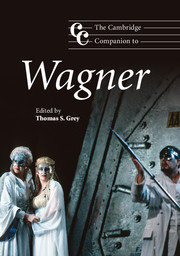Book contents
- Frontmatter
- PART I Biographical and historical contexts
- 1 Wagner lives: issues in autobiography
- 2 Meister Richard's apprenticeship: the early operas (1833–1840)
- 3 To the Dresden barricades: the genesis of Wagner's political ideas
- PART II Opera, music, drama
- PART III Ideas and ideology in the Gesamtkunstwerk
- PART IV After Wagner: influence and interpretation
- Notes
- Select bibliography
- Index
3 - To the Dresden barricades: the genesis of Wagner's political ideas
from PART I - Biographical and historical contexts
Published online by Cambridge University Press: 28 September 2011
- Frontmatter
- PART I Biographical and historical contexts
- 1 Wagner lives: issues in autobiography
- 2 Meister Richard's apprenticeship: the early operas (1833–1840)
- 3 To the Dresden barricades: the genesis of Wagner's political ideas
- PART II Opera, music, drama
- PART III Ideas and ideology in the Gesamtkunstwerk
- PART IV After Wagner: influence and interpretation
- Notes
- Select bibliography
- Index
Summary
Colliding worlds: the revolutionary impulse
On 28 May 1849, a political refugee named Richard Wagner crossed Lake Constance on a steamer to Switzerland. He had spent most of the previous month in flight or hiding because of his role in an uprising in Dresden that had begun on 3 May and was crushed within four days. Before then, for seven years, he served as Kapellmeister in the Saxon capital; he was now a wanted man. His closest comrades in the revolt, including his musical colleague and friend, August Röckel, were captured and soon condemned to death. (The sentences were not carried out, though these others did serve extended prison sentences.) The revolutionary provisional government had quit Dresden before advancing Prussian and Saxon troops. Most of its leaders, aiming to regroup, made their way to Chemnitz, to the west. The Kapellmeister – who had backed but was not a member of the government – went too, but stopped at a different hotel. Consequently, he did not fall into the trap that awaited the other insurrectionists.
Wagner scurried away, arriving eventually in Weimar where Franz Liszt, who was then rehearsing Tannhäuser, sheltered him. “I found it difficult to tell my friend that I had not left Dresden as Royal Kapellmeister in an entirely regular way,” Wagner recalled. “To tell the truth,” he added, “I had an extremely hazy conception of my relationship to the laws of what was, in the narrower sense, my native country. Had I committed a criminal act according to these laws or not? I couldn't come to any real conclusion about it” (ML 412).
- Type
- Chapter
- Information
- The Cambridge Companion to Wagner , pp. 47 - 64Publisher: Cambridge University PressPrint publication year: 2008
- 4
- Cited by

